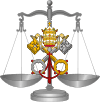Tra le sollecitudini
 |
| Part of a series on the |
| Jurisprudence of Catholic canon law |
|---|
|
|
|
Trials and tribunals |
|
Canonical structures Particular churches
|
|
|
Tra le sollecitudini (Italian for "among the concerns") was a motu proprio issued 22 November 1903 by Pope Pius X, possibly co-written by Don Lorenzo Perosi, in which the Pope set forth new regulations for the performance of music in the Roman Catholic Church. At the time "operatic Church-music" was dominant in Italy.[1] These reforms reaffirmed the primacy of Gregorian chant, which had largely fallen out of favor, and the superiority of Renaissance polyphony, especially that of Giovanni Pierluigi da Palestrina, over other, later polyphonic music. It also prohibited mixed-sex ensembles, discouraged music with secular influences, and barred the use of piano, percussion, and all other instruments aside from the organ, unless given special permission from an Ordinary to use wind instruments.[2] In 2003, Pope John Paul II recalled the document and re-proposed certain principles in liturgical music, in his chirograph For the Centenary of the Motu Proprio "Tra Le Sollecitudini." [3]
References
- ↑ Ratzinger, Cardinal Joseph. "In the Presence of the Angels I Will Sing Your Praise: The Regensburg Tradition and the Reform of the Liturgy". Adoreums Bulletin. Verlag Herder. Retrieved 26 October 2014.
- ↑ Pope Pius X (1903-11-22). "Tra le Sollecitudini Instruction on Sacred Music". Retrieved 2008-11-26.
- ↑ "Chirograph of the Supreme Pontiff John Paul II for the Centenary of the Motu Proprio "Tra Le Sollecitudini"". December 3, 2003. Retrieved December 9, 2015.